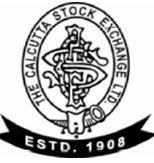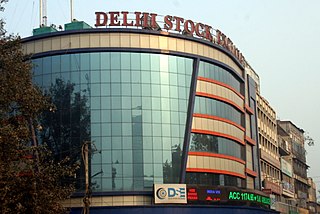Related Research Articles

The Securities and Exchange Board of India (SEBI) is the regulatory body for securities and commodity market in India under the administrative domain of Ministry of Finance within the Government of India. It was established on 12 April 1988 as an executive body and was given statutory powers on 30 January 1992 through the SEBI Act, 1992.

BSE Limited, also known as the Bombay Stock Exchange (BSE), is an Indian stock exchange which is located on Dalal Street. Established with the efforts of cotton merchant Premchand Roychand in 1875, it is the oldest stock exchange in Asia, and also the tenth oldest in the world. The BSE is the world's 6th largest stock exchange with a market capitalization exceeding US$5 trillion on May 21, 2024.
The Madras Stock Exchange (MSE) was a stock exchange in Chennai, India. The now defunct MSE was the fourth stock exchange to be established in the country and the first in South India. It had a turnover (2001) of ₹ 3,090 crore, but was a fraction of the turnover generated by the Bombay Stock Exchange and National Stock Exchange of India. The turnover of the stock exchange was 19,907 Crore as of the financial year 2012.
Ludhiana Stock Exchange (LSE) is a defunct stock exchange that was fully owned by Government of India. It was established in the year 1983. By 1999-2000, the exchange had a total of 285brokers, out of which 79 were corporate brokers. Among 284 brokers, it was further classified as 212 proprietor broker, 2 partnership broker and 70 corporate broker. Then, there was only 2 sub-brokers registered.

Inter-connected Stock Exchange Ltd. (ISE) is an Indian national-level stock exchange. under the ownership of Ministry of Finance, Government of India. It is responsible for providing trading, clearing, settlement, risk management and surveillance support to its trading members. It started its operation in 1998 in Vashi, Mumbai, and has 841 trading members, who are located in 18 cities. These intermediaries are administratively supported through the regional offices at Delhi, Kolkata, Patna, Ahmedabad, Coimbatore and Nagpur, besides Mumbai.
Bangalore Stock Exchange (BgSE), was a public stock exchange based in Bangalore, India fully owned by Government of India. It was founded in 1963 and had 595 regional and non-regional companies listed. In September 2005, the BgSE announced plans to go public by divesting at least 51% of its ownership. The stock exchange was managed by a Council of Management, consisting of members appointed by the Securities and Exchange Board of India. It was the first stock exchange in South India to start electronic trading of securities in 1996.

Calcutta Stock Exchange (CSE) is an Indian stock exchange based in Kolkata, India. It is owned by Ministry of Finance, Government of India. It is one of oldest stock exchanges in Asia and third largest bourse in India. It was founded in May 1908 at 2, China Bazar Street.
Cochin Stock Exchange was an Indian stock exchange in Kochi, Kerala fully owned by Government of India. It was incorporated in 1978. At its peak, it had almost 500 Indian companies listed, and with a daily turnover of ₹70–₹100 crore, it was the fourth largest exchange in India.
Madhya Pradesh Stock Exchange (MPSE) was a stock exchange located at Indore, Madhya Pradesh, India. It was a SEBI recognized Permanent Stock Exchange, until its de-recognition in 2015. Established in 1919, it was 3rd oldest stock exchange in India, and a leading stock exchange under outcry system.

The Ahmedabad Stock Exchange (ASE) is the second oldest exchange of India located in the city of Ahmedabad in the Western part of the country and is fully owned by Government of India. It is recognised by Securities Contract (Regulations) Act, 1956 as permanent stock exchange. Its logo consists of the Swastika, which is one of the most auspicious symbols of Hinduism depicting wealth and prosperity.
Bhubaneswar Stock Exchange (BhSE) was a stock exchange located in Bhubaneswar, Odisha, India. It was incorporated on 17 April 1989, and granted recognition to the Stock Exchange on 5 June 1989, by the Ministry of Finance, Govt. of India. It is one among the 21-odd regional stock exchanges in India.

Delhi Stock Exchange (DSE) was a stock exchange located in New Delhi.
Vadodara Stock Exchange (VSE) is a defunct stock exchange located in the city of Vadodara, and fully owned by Government of India in Western India. It was established in 1990 at Vadodara. It is the only existing stock exchange in the state of Gujarat along with Ahmedabad. It is recognized by the Securities Contract (Regulations) Act of 1956 as a permanent stock exchange.
Magadh Stock Exchange Association Ltd (MSEA) is located in Patna, India. It was established in the year 1986. It is one among the 25 odd regional stock exchanges in India. The exchange was disbanded on 3 September 2007 by Securities and Exchange Board of India (SEBI).

Motilal Oswal Financial Services Limited is an Indian financial services company offering a range of financial products and services. The company was founded by Motilal Oswal and Raamdeo Agrawal in 1987.
Pune Stock Exchange (PSE) was established in 1982. The Securities and Exchange Board of India (SEBI) allowed the exchange to exit bourse business with an order on 13 April 2015. Earlier, the SEBI had allowed various stock exchanges including OTC Exchange of India, Cochin Stock Exchange, Ludhiana Stock Exchange, Gauhati Stock Exchange, Bhubaneswar Stock Exchange, Hyderabad Stock Exchange, Coimbatore Stock Exchange, Inter-connected Stock Exchange of India and Bangalore Stock Exchange to exit from the bourse business.
IIFL Finance Limited d/b/a IIFL and India Infoline Finance Limited, is an Indian diversified financial services company headquartered in Mumbai. The organisation was founded by Nirmal Jain. IIFL and its group companies are backed by Canadian investor Prem Watsa, private equity firm General Atlantic and CDC Group, the UK Government's private equity arm. IIFL is ranked among the top seven financial conglomerates in India and as the top independent financial services firm in India in terms of market capitalisation. Nirmal Jain is the chairman of the group, while R Venkataraman is the group managing director and co-promoter.
Religare Enterprises Limited (REL) is an Indian investment and financial services holding company, headquartered in New Delhi. REL is listed on National Stock Exchange of India and Bombay Stock Exchange. It is registered with the Reserve Bank of India (RBI).
Angel One Limited, formerly known as Angel Broking Limited, is an Indian stockbroker firm established in 1996. The company is a member of the Bombay Stock Exchange, National Stock Exchange of India, National Commodity & Derivatives Exchange Limited and Multi Commodity Exchange of India Limited. It is a depository participant with Central Depository Services Limited (CDSL).
References
- ↑ "Sebi allows Gauhati Stock Exchange exit from bourse business - The Hindu".
- ↑ "Gauhati Stock Exchange receives SEBI nod to exit business". business-standard.com. business-standard.com. Retrieved 29 May 2017.